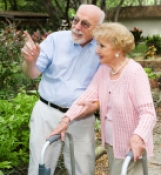 I want to provide the facts on a comment I received regarding a reverse mortgage for a couple where one is considered a community spouse, i.e. one living in the community and the other is not and receiving Medicaid assistance. This person stated that if a reverse mortgage was put in place for a couple to provide the money for the expenses where one needs more in home care than the spouse can give, then after the ill person passes away, the remaining “community spouse” would have no or little money AND no place to live.
I want to provide the facts on a comment I received regarding a reverse mortgage for a couple where one is considered a community spouse, i.e. one living in the community and the other is not and receiving Medicaid assistance. This person stated that if a reverse mortgage was put in place for a couple to provide the money for the expenses where one needs more in home care than the spouse can give, then after the ill person passes away, the remaining “community spouse” would have no or little money AND no place to live.
In reality, the reverse mortgage is a great tool for keeping seniors in their homes and paying for home care whether a single person or as a couple. An additional benefit for them is the reverse mortgage is not considered income so the borrowers may still receive public benefits such as Medicaid or other county benefits in addition to the reverse mortgage. They can also receive VA benefits if they qualify. Depending on the circumstances, Medicaid could cover the home care costs, the reverse mortgage could be used for things not covered by Medicaid and for the needs of the community spouse, i.e. maintaining the home, paying taxes, insurance, auto expenses, groceries, etc.
With both names on title, when the ill person passes away the community spouse would still have a place to live as they can stay in the home because the loan is not due and payable until the home is no longer their primary residence or on the 150th birthday of the youngest borrower. This means they can still have a roof over their head without having to make monthly mortgage or rent payments.
In fact the reverse mortgage can provide funds for more care than selling and moving into senior housing. When one sells, the net proceeds would be used to pay rent in senior housing as well as for home care whereas when staying in ones’ home the expense is lower, there is no rent payment and they would have a roof over their head. One of my Blog articles, “Be Educated About Your Options of Care And Financing The Care,” compares the differences of costs of selling and moving to staying in the home with a reverse mortgage and receiving home care.
Let me share the story of my clients, Bob and Jean. Jean had some memory loss issues so she was in a memory care Assisted Living facility. At the recommendation of their Elder Law Attorney Bob decided to do the reverse mortgage to pay for Jean’s rent and care. Jean was living in a private pay facility so the reverse mortgage allowed her to remain in the same place and not have her rely on government funding. The reverse mortgage provided them the control and choice of where Jean would live. The reverse mortgage also freed up some cash flow for Bob as the community spouse since Jean’s care was no longer coming from his Social Security or pension.
When Jean passed away the reverse mortgage funds were no longer needed for her care so there was more funds were available for Bob’s use. When Bob needed some additional care assistance of his own the reverse mortgage funds were used for his home care needs. Bob was able to have funds and live in his home until his death several years after the reverse mortgage was originated. This couple received what everyone of us desires: their desired security (having a place to live), independence (not relying on others), dignity (they could make their own decisions), and control (deciding where they were to live).
Experienced reverse mortgage originators along with a team of an Elder Law Attorney, care manager, and home care agency who is familiar with reverse mortgages can to help determine what is right for a senior’s situation especially when they may need home care or the decision of when one may need a care center.
The reverse mortgage can be a lifesaver for seniors even as a community spouse. Through the years I’ve been fortunate to help many seniors in these circumstances providing them with security, independence, dignity, and control.
© 2010 Beth Paterson, Beth’s Reverse Mortgage Blog, 651-762-9648
This material may be re-posted provided it is re-posted in its entirety without modifications and includes the contact information, copyright information and the following link: http://wp.me/p4EUZQ-fJ
Review these additional articles for facts and how reverse mortgages have benefited seniors:
- “Respect for Oneself Increases With A Reverse Mortgage”
- “Finance Retirement with A Reverse Mortgage”
- “Know A Senior Who Wants Security, Independence, Dignity, and Control?”
- “Reverse Mortgages Help Celebrate Independence”
- “Reverse Mortgages Answer Prayers”
- “Reverse Mortgages Finance Home Care”
Blog posts’ information is current as of date post published, program is subject to change in in the future. Contact us for current information, 651-762-9648.
This site or the information provided is not from, or approved by, HUD, FHA, or any US Government or Agency.











